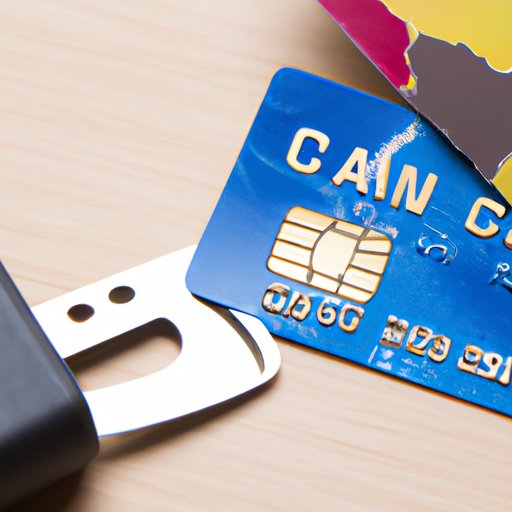Introduction
Credit is an important part of modern life. It’s used to purchase homes, cars, and other large items. It’s also used to finance smaller purchases like furniture or vacations. To access credit, you need a good credit score. But if you’re just starting out, you may not have one yet. Fortunately, there are steps you can take to start building your credit for the first time.
Definition of Credit
Before we dive into the details of building credit for the first time, let’s define what it means. Credit is the ability to borrow money from a lender with the understanding that you’ll pay it back over time. Your credit score is a three-digit number that reflects your creditworthiness. The higher your score, the better your chances of getting approved for loans or credit cards. A good credit score is generally considered to be 700 or above.

Overview of Building Credit for the First Time
The process of building credit for the first time can seem daunting, but it doesn’t have to be. With the right strategy, you can establish a good credit score in no time. Here are some of the best ways to start building your credit: open a secured credit card, become an authorized user on someone else’s credit card, get a co-signer for a loan or credit card, take out a small loan, make regular, on-time payments, and monitor your credit report and score.

Open a Secured Credit Card
One of the easiest and most accessible ways to start building credit is to open a secured credit card. A secured credit card is backed by a cash deposit, which acts as collateral for the card issuer. If you don’t make your payments, the issuer can use the deposit to cover them. Because of this protection, secured credit cards are easier to get than traditional credit cards.
Benefits of Secured Credit Cards
Secured credit cards offer several benefits. They typically come with lower interest rates and fees than traditional cards. And they report your payment activity to the major credit bureaus, which helps you build your credit score over time. According to Experian, “Your payment history is the most important factor in your FICO® Score calculation, accounting for 35% of your score.”1 This means that making on-time payments with a secured credit card is a great way to start building your credit.
How to Choose the Right Secured Credit Card
When shopping for a secured credit card, look for one with a low annual fee and a high spending limit. You should also consider the rewards offered by the card. Some secured cards offer cash back or points for everyday purchases, so you can earn money while building your credit.
What to Watch Out For with Secured Credit Cards
Be aware that some secured credit cards come with hidden fees and high interest rates. Make sure to read the fine print before signing up for a card, so you know exactly what you’re getting into. Also, keep in mind that many secured cards require a hard credit check, which can temporarily lower your credit score.2 Finally, once you’ve established a good credit score, make sure to switch to an unsecured credit card to avoid paying the yearly deposit.
Become an Authorized User on Someone Else’s Credit Card
Another option for building credit is to become an authorized user on someone else’s credit card. As an authorized user, you’ll receive a copy of the card in your name, but you won’t be responsible for making payments. Instead, the primary cardholder will be responsible for all charges. However, your credit activity will still be reported to the credit bureaus, so you can benefit from their positive payment history.
Benefits of Becoming an Authorized User
One of the biggest benefits of becoming an authorized user is that it can help improve your credit score quickly. According to a study by the Consumer Financial Protection Bureau, “a person’s credit score can increase by an average of 20 points after being added as an authorized user.”3 This can give you a head start on building your credit.
Who Can Make You an Authorized User?
You can become an authorized user on any credit card held by a family member or close friend. It’s important to choose someone who has good credit and a history of making on-time payments. You should also make sure they’re willing to add you as an authorized user.
Potential Risks of Becoming an Authorized User
It’s important to remember that becoming an authorized user comes with risks. If the primary cardholder makes late payments or carries a high balance, it could hurt your credit score. That’s why it’s important to choose someone who is financially responsible.
Get a Co-Signer for a Loan or Credit Card
If you’re having trouble getting approved for a loan or credit card, you may want to consider getting a co-signer. A co-signer is someone who agrees to share responsibility for the loan or credit card. They’ll be equally responsible for making payments, so it’s important to choose someone you trust.
Benefits of Having a Co-Signer
Having a co-signer can be beneficial for a few reasons. First, it can help you get approved for a loan or credit card that you wouldn’t be able to get on your own. Second, it can help you get a better interest rate or terms. Finally, it can help you build your credit faster, since the payments will be reported to the credit bureaus.
Finding a Co-Signer
When looking for a co-signer, start with a family member or close friend. Make sure they understand the risks involved and are comfortable with taking on the responsibility. You should also make sure they have good credit and a history of making on-time payments.
Potential Drawbacks of Having a Co-Signer
It’s important to remember that having a co-signer comes with risks. If you miss payments or carry a high balance, it could hurt your co-signer’s credit score. That’s why it’s important to be diligent about making payments on time.

Take Out a Small Loan
Taking out a small loan is another way to start building credit. It’s important to choose a loan that fits your budget and repayment schedule. For example, if you’re looking for a short-term loan, you may want to consider a payday loan. Or if you’re looking for a longer-term loan, you may want to consider an installment loan.
Benefits of Taking Out a Small Loan
Taking out a small loan can be beneficial for a few reasons. First, it can help you build your credit score by demonstrating your ability to manage debt. Second, it can help you build an emergency fund or save for an upcoming purchase. And third, it can help you establish a relationship with a lender, which can be beneficial when you’re ready to apply for a larger loan.
Types of Loans That Can Help Build Credit
When choosing a loan, look for one with a low interest rate and reasonable repayment terms. You should also make sure the loan reports to the major credit bureaus, so you can benefit from making on-time payments. Here are some types of loans that may help you build credit: payday loans, auto title loans, installment loans, and peer-to-peer loans.
Potential Risks of Taking Out a Small Loan
It’s important to remember that taking out a loan comes with risks. If you miss payments or carry a high balance, it could hurt your credit score. That’s why it’s important to make sure you can afford the loan before you take it out.
Make Regular, On-Time Payments
Making regular, on-time payments is one of the most important steps in building credit. This shows lenders that you’re reliable and responsible with your finances. It also demonstrates that you can be trusted to repay your debts.
Benefits of Making Regular, On-Time Payments
Making regular, on-time payments can help you build your credit score in several ways. First, it can help you establish a positive payment history. Second, it can help you lower your credit utilization ratio, which is the amount of credit you’re using relative to the amount available to you. And third, it can help you demonstrate financial responsibility.
Ways to Ensure You Make On-Time Payments
There are several ways to make sure you make on-time payments. First, set up automatic payments from your bank account. Second, sign up for alerts from your lender or credit card company, so you’ll be reminded when payments are due. Third, create a budget and stick to it. And finally, stay organized by keeping all your bills in one place.
Monitor Your Credit Report and Score
Finally, it’s important to monitor your credit report and score regularly. This will help you stay on top of your credit activity and identify any potential issues. You should also use this information to develop a plan for improving your credit score.
Benefits of Monitoring Your Credit Report and Score
Monitoring your credit report and score can help you identify and address any errors or inaccuracies. It can also help you spot any suspicious activity, such as a new account opened in your name without your knowledge. Finally, it can help you stay on top of your credit activity and make sure you’re on the right track.
How to Monitor Your Credit Report and Score
It’s easy to monitor your credit report and score. You can get a free copy of your credit report from each of the three major credit bureaus once a year. You can also use a credit monitoring service to track your activity more frequently. And you can get your credit score for free from many banks and credit card issuers.
Conclusion
Building your credit for the first time can be intimidating, but it doesn’t have to be. With the right strategy and a little bit of patience, you can establish a good credit score in no time. To get started, open a secured credit card, become an authorized user on someone else’s credit card, get a co-signer for a loan or credit card, take out a small loan, make regular, on-time payments, and monitor your credit report and score. With a little effort, you’ll be well on your way to building a strong credit history.
Summary of Steps to Building Credit
To build your credit for the first time, follow these steps: open a secured credit card, become an authorized user on someone else’s credit card, get a co-signer for a loan or credit card, take out a small loan, make regular, on-time payments, and monitor your credit report and score.
Final Words of Encouragement
Building your credit for the first time can be a long and challenging process. But with the right strategy and a little bit of patience, you can establish a good credit score in no time. Just remember to make wise financial decisions, stay organized, and stay on top of your credit activity.
(Note: Is this article not meeting your expectations? Do you have knowledge or insights to share? Unlock new opportunities and expand your reach by joining our authors team. Click Registration to join us and share your expertise with our readers.)
